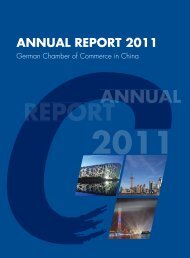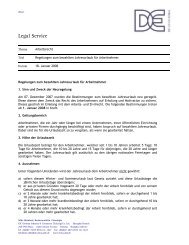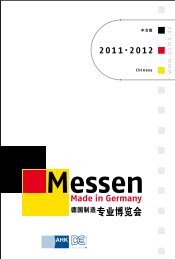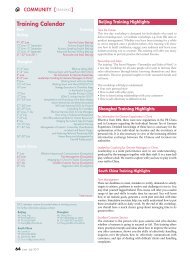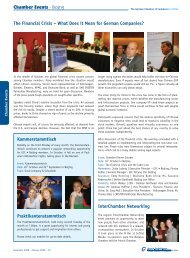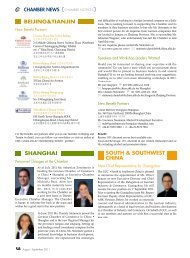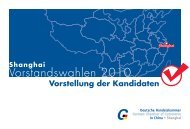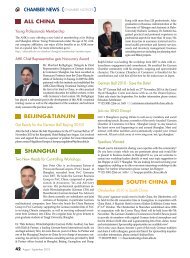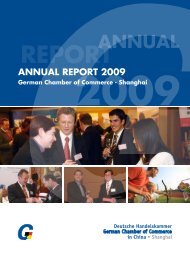Minister Schavan - AHK - AHKs
Minister Schavan - AHK - AHKs
Minister Schavan - AHK - AHKs
Create successful ePaper yourself
Turn your PDF publications into a flip-book with our unique Google optimized e-Paper software.
Beijing • Guangzhou • Shanghai<br />
June - July<br />
3 | 2008<br />
<strong>Minister</strong> <strong>Schavan</strong><br />
Cover Story: Sino-German Education & Research<br />
German Chamber Supports Earthquake Relief | Members Elect New Board | Events Promote German Green Building Know-How<br />
IN THIS ISSUE:
With an optimized, strategic business alignment and<br />
a persuasive, creative appearance, we will give your brand<br />
a competitive edge that will ensure lasting profit growth.<br />
With expertise and a personal touch, Montfort Werbung<br />
will support you in all areas of successful brand leadership –<br />
in the US, Europe and Asia.<br />
MONTFORT SHANGHAI<br />
Yeeeeeeeeeeeeha!<br />
SHANGHAI (CN) · KLAUS (A) · RUGGELL (FL) · CHICAGO (USA)<br />
Room 1101, 555 Nanjing West Road, 200041 Shanghai<br />
Contact person: Oliver Lorenz, B2B@montfortshanghai.com<br />
Tel. +86 (0) 21 / 52 13 66 00 - 800
GCC Board<br />
Beijing<br />
* All-China Board member<br />
June - July 2008 | 2<br />
Siemens Ltd. China<br />
President and CEO<br />
Dr. Richard Hausmann *<br />
Chairman<br />
KPMG Huazhen Certified Public<br />
Accountants<br />
Partner Audit<br />
Mr. Andreas Feege<br />
Treasurer<br />
Lufthansa German Airlines<br />
Chief Representative for China<br />
Mr. Gregor Wende<br />
German National<br />
Representative to the EUCCC<br />
German Chamber Beijing<br />
Executive Director<br />
Ms. Jutta Ludwig *<br />
Delegate & Chief Representative<br />
Delegation of German Industry<br />
& Commerce Beijing<br />
Deutsche Bank (China) Co. Ltd.<br />
Beijing Branch<br />
Director, Head of Corporate Banking<br />
Coverage, China<br />
Mr. Eddy Henning<br />
Gruner+Jahr (Beijing)<br />
Advertising Co. Ltd.<br />
General Manager & President<br />
Mr. Wolfgang Kohl<br />
Volkswagen (China)<br />
Investment Co. Ltd.<br />
Executive Vice President,<br />
Finance Department<br />
Dr. Joerg Mull<br />
Bayer (China) Ltd.<br />
Vice President, Corporate Social<br />
Responsibility Greater China<br />
Mr. William Valentino<br />
Daimler Northeast Asia Ltd.<br />
Chairman & CEO<br />
Mr. Ulrich Walker<br />
Shanghai Guangzhou<br />
Lufthansa German Airlines<br />
Managing Director Greater China<br />
Mr. Arved von zur Mühlen *<br />
Chairman<br />
Bosch (China) Investment Ltd.<br />
Executive Vice President<br />
Mr. Elmar E. Weitzel<br />
Vice Chairman<br />
Vossloh Fastening Systems<br />
(China) Co. Ltd.<br />
CEO<br />
Mr. Thomas Dorn<br />
Treasurer<br />
German Chamber Shanghai<br />
Executive Director<br />
Mr. Manfred Rothgaenger *<br />
Delegate & Chief Representative<br />
Delegation of German Industry<br />
& Commerce Shanghai<br />
Beiten Burkhardt Shanghai<br />
Representative Office<br />
Chief Representative<br />
Mr. Rainer Burkhardt<br />
Siemens Shanghai Medical<br />
Equipment Ltd.<br />
President and CEO<br />
Dr. Rolf Hubke<br />
POLYMAX (Shanghai) Trading<br />
Co. Ltd.<br />
Chairman of the Board<br />
Mr. Ulrich Mäder<br />
Allianz China Life Insurance<br />
Co. Ltd.<br />
CEO<br />
Mr. Christian Molt<br />
Management Engineers<br />
China Ltd.<br />
Managing Director<br />
Ms. Brigitte Wolf<br />
The German Chamber of Commerce in China<br />
German Chamber Guangzhou<br />
Executive Director<br />
Ms. Alexandra Voss *<br />
Delegate & Chief Representative<br />
Delegation of German Industry &<br />
Commerce Guangzhou<br />
Lufthansa German Airlines<br />
Guangzhou<br />
General Manager, Southern China<br />
Mr. Nico Beilharz<br />
TCA Ltd. The Cable Assembler<br />
Dongguan<br />
CEO / President<br />
Mr. Frank Jaeger<br />
VA TECH ELIN Transformer<br />
Guangzhou Co. Ltd. (Siemens)<br />
Group<br />
General Manager<br />
Mr. Dirk Soete<br />
Trolli Confectionnery Co. Ltd.<br />
Guangzhou<br />
General Manager<br />
Mr. Michael Stein<br />
C. Melchers GmbH & Co. KG<br />
Guangzhou & Chongqing<br />
Representative Offices<br />
Inspirion GmbH Guangzhou<br />
Representative Office<br />
Chief Representative<br />
Renate Tietjen
The German Chamber of Commerce in China<br />
www.china.ahk.de 3 | June - July 2008
Preface<br />
The GC Ticker is the internal bi-monthly newsletter<br />
of the German Chamber of Commerce in China.<br />
Publisher<br />
German Chamber of Commerce in China<br />
Managing Editor<br />
Ms. Kristen Robinson (Shanghai)<br />
Editorial Team<br />
Mr. Walter Jansen (Beijing)<br />
Mr. Kilian Becker (Guangzhou)<br />
Design<br />
Image Check Shanghai<br />
GC Ticker is free of charge. For subscription or<br />
extra copies please email your nearest Chamber<br />
office<br />
Other issues of the magazine can be found on<br />
our website: www.china.ahk.de/en/chamber/<br />
shanghai/<br />
For editorial or sponsorship inquiries please<br />
contact:<br />
German Chamber of Commerce in China<br />
Beijing Office<br />
German Chamber of Commerce<br />
in China • Beijing<br />
0811 Landmark Tower 2, 8 Dongsanhuan (N) Rd.<br />
Chaoyang, Beijing 100004<br />
Tel: +86-10-6590 0926 ext. 308<br />
Fax: +86-10-6590 6313<br />
Email: jansen.walter@bj.china.ahk.de<br />
Guangzhou Office<br />
German Chamber of Commerce<br />
in China • Guangzhou<br />
2915 Metro Plaza, Tianhe (N) Rd.<br />
Guangzhou 510075<br />
Tel: +86-20-8755 2353<br />
DL: +86-20-8755 8203<br />
Fax: +86-20-8755 1889<br />
Email: becker.kilian@gz.china.ahk.de<br />
Shanghai Office<br />
German Chamber of Commerce<br />
in China • Shanghai<br />
29F, POS Plaza, 1600 Century Ave.<br />
Pudong, Shanghai 200122<br />
Tel: +86-21-5081 2266, ext. 1637<br />
Fax: +86-21-5081 2009<br />
Email: robinson.kristen@sh.china.ahk.de<br />
© 2007-2008. German Chamber of Commerce in China.<br />
No part of this publication may be reproduced without<br />
the publisher’s prior permission. While every effort had<br />
been made to ensure accuracy, the publisher is not responsible<br />
for any errors. Views expressed are not necessarily<br />
those of GIC/GCC.<br />
June - July 2008 | 4<br />
Dear Reader,<br />
As the industrialized world slides toward possible<br />
recession, could booming developing<br />
nations come to its aid? Can China or India save<br />
America or Europe?<br />
Although economies such as China and India<br />
are growing quickly, they are still much too<br />
small to pull giants such as the United States<br />
or Europe out of a possible economic downturn.<br />
For the first time, however, developing countries<br />
– now accounting for more than half of<br />
global economic growth – could probably ride<br />
out the storm afflicting richer nations. Many<br />
experts claim that while “China is not going<br />
to save the world,” it is part of a very different<br />
picture. The US, Europe, and Japan will go<br />
in one direction, and countries like China and<br />
India will carry on in another.<br />
While emerging market growth cannot turn a<br />
round the recession, it may at least cushion the<br />
blow. Emerging markets will continue to import<br />
the industrial machinery that Europe, US, Japan<br />
and other developed nations manufacture, and<br />
will still have an appetite for raw materials such<br />
as oil and minerals from the Middle East, Africa<br />
and Latin America.<br />
America will still determine much of what<br />
happens in the world economy this year. Other<br />
countries are already ratcheting down their<br />
growth forecasts because of headwinds facing<br />
the world’s largest consumer nation. At the<br />
same time, many financial analysts fear that<br />
the effects of the sub prime mortgage crisis<br />
have yet to fully unravel, and that banks worldwide<br />
could see their balance sheets weakened.<br />
Despite such forecasts in the West, from China<br />
to Brazil people are busy building bridges,<br />
information networks, even whole cities. Developing<br />
economies are selling goods and services<br />
to one another, not just to the West. They are<br />
buying more products than ever from developed<br />
nations – a boon for now-struggling developed<br />
economies.<br />
The German Chamber of Commerce in China<br />
Domestic Market Drives<br />
Chinese Economy<br />
Arved von zur Mühlen<br />
Chairman | GCC • Shanghai<br />
In China, for example, the real engines of<br />
growth are not factories exporting clothes<br />
and computers, though that visible sector has<br />
fueled a USD 260bn annual trade surplus. The<br />
lion’s share of Chinese GDP growth is domestic,<br />
and not a function of the international<br />
economy. Past global downturns have not<br />
slowed China. Even if Chinese exporters took a<br />
hit, previous trade slumps have had practically<br />
no ripple effect on the Chinese economy. This<br />
time, there is no question that China will lose<br />
a little GDP growth in the export sector, but<br />
it will gain some of that back in investment.<br />
China’s race to build more roads, railways,<br />
homes, and factories contributed most to its<br />
11.4% GDP growth last year, and that trend is<br />
set to continue.<br />
Even if falling exports of Chinese consumer<br />
goods to America and Europe cut 2 percentage<br />
points off last year’s growth rate – a common<br />
prediction – the fact that China is not tanking<br />
will be a comfort to economic planners elsewhere.<br />
It will also mean that China will continue<br />
to import raw materials and high-tech<br />
machinery. In the commodities field, China will<br />
be very important and, at the margins, it can<br />
certainly help the US and Europe.<br />
Recent news about rising consumer price levels<br />
has not yet influenced the positive outlook of<br />
the German business community in China. Most<br />
companies have achieved or even exceeded<br />
their business goals in 2007, and want to<br />
further expand in China. Let’s hope for further<br />
economic development, successful Olympic<br />
Games and an ever stronger Sino-German partnership<br />
to make it happen.<br />
Enjoy reading the GC Ticker!
The German Chamber of Commerce in China<br />
10<br />
12<br />
14<br />
16<br />
18<br />
22<br />
24<br />
32<br />
35<br />
42<br />
44<br />
52<br />
54<br />
46<br />
Business Focus<br />
Education Key to Development<br />
<strong>Minister</strong> <strong>Schavan</strong> promotes Sino-German<br />
cooperation in the fields of research,<br />
innovation, education and investment to<br />
foster economic growth<br />
Clean and Clear:<br />
Water treatment projects create opportunities<br />
for small technology suppliers in China<br />
Chongqing: Germany and China<br />
– moving ahead together<br />
German Organizations Raise RMB 2 Million<br />
for Earthquake, Present Urban Development<br />
Solutions<br />
Giving Feedback & Managing<br />
Performance Across Cultures<br />
How to get the most out of your employees in<br />
a multicultural environment<br />
Regional Spotlight:<br />
Tianjin TEDA<br />
Changshu<br />
Chongqing<br />
Chamber News<br />
All China<br />
China First Hand success in Munich<br />
Beijing<br />
Guangzhou<br />
Shanghai<br />
Chambers elect new board members for<br />
2008-2010, enjoy happy hour social events<br />
Around Town<br />
All China<br />
Beijing<br />
Guangzhou<br />
Venetian Carnival brings together South China<br />
chambers of commerce for a colorful evening<br />
Shanghai<br />
Benefit Program<br />
Yellow Pages<br />
Centerfold Special<br />
Latest update on all your favorite<br />
venues offering GCC members discounts<br />
throughout China.<br />
14<br />
32<br />
54<br />
10<br />
22<br />
39<br />
86<br />
Contents<br />
Members Mix<br />
Meet the Member<br />
Member News<br />
Updates from our member companies: relocations,<br />
new management, community events<br />
and anniversaries<br />
New Members:<br />
Beijing<br />
Guangzhou<br />
Shanghai<br />
Community<br />
Olympics in Brief<br />
China sends first-ever equestrian to<br />
Olympics, puts finishing touches on facilities<br />
Expo in Brief<br />
Germany announces plan for Expo 2010<br />
German Pavilion<br />
www.china.ahk.de 5 | June - July 2008<br />
Sports<br />
Training Courses<br />
Education<br />
Environment<br />
Energy Efficiency – Made in Germany –<br />
Chinese government gives the green light to<br />
environmentally-friendly building initiatives<br />
Travel<br />
WWF promotes ecotourism project in southeastern<br />
Tibet’s unique biosphere<br />
Giving Back<br />
Inspired by adopted daughter, JiaJia<br />
association reaches out to the children of<br />
Anhui province<br />
Books<br />
City Tour<br />
Wander through the forgotten Old Summer<br />
Palace, rediscover this history of China’s<br />
relationship to the West<br />
Art & Culture<br />
“Frankfurt am Perlfluss” event brings<br />
German musicians to Guangzhou, German artists<br />
inspire Chinese audiences<br />
Community Events<br />
Competitions<br />
Benefit Program Update<br />
Two new Shanghai hotels offer Chamber<br />
members discounts in prime downtown locations<br />
Chamber Events Calendar<br />
50<br />
54<br />
64<br />
76<br />
78<br />
79<br />
80<br />
81<br />
82<br />
83<br />
84<br />
85<br />
86<br />
88<br />
89<br />
90<br />
91<br />
92
Chamber Teams<br />
Your company on<br />
the desks of<br />
our members -<br />
China-wide<br />
Advertise in the most<br />
frequently used directory of<br />
German companies in China.<br />
Limited placements still<br />
available, contact your local<br />
Chamber for details.<br />
Beijing<br />
Ms. Katrin Loch<br />
010 6590-6930<br />
Email: loch.katrin@bj.china.ahk.de<br />
Guangzhou<br />
Mr. Kilian Becker<br />
020 8755-8203<br />
becker.kilian@gz.china.ahk.de<br />
Shanghai<br />
Ms. Li Yandi<br />
021 5081-2266 ext. 1609<br />
li.yandi@sh.china.ahk.de<br />
June - July 2008 | 6<br />
Beijing<br />
Guangzhou<br />
Shanghai<br />
Ms. Katrin Loch<br />
Executive Chamber Manager<br />
Tel: 010 6590-6930<br />
Email: loch.katrin@bj.china.ahk.de<br />
Ms. Claudia Barkowsky<br />
Regional Manager North China<br />
Tel: 010 6590-0926 ext. 329<br />
Email: barkowsky.claudia@bj.china.ahk.de<br />
Mr. Kilian Becker<br />
Manager Membership & Events<br />
Tel: 020 8755-8203<br />
Fax: 020 8755-1889<br />
Email: becker.kilian@gz.china.ahk.de<br />
Ms. Anna-Lisa Hartmann<br />
Senior Manager Chamber Affairs<br />
Tel: 021 5081-2266 ext. 1630<br />
Fax: 021 5081-2266 ext. 5630<br />
Email: hartmann.anna-lisa@sh.china.ahk.de<br />
Ms. Heidrun Buss<br />
Project & Event Manager Shanghai<br />
Tel: 021 5081-2266 ext. 1656<br />
Fax: 021 5081-2266 ext. 5656<br />
Email: buss.heidrun@sh.china.ahk.de<br />
Ms. Li Yandi<br />
Project Manager<br />
Tel: 021 5081-2266 ext. 1609<br />
Fax: 021 5081-2266 ext. 5609<br />
Email: li.yandi@sh.china.ahk.de<br />
The German Chamber of Commerce in China<br />
Ms. Lina Sun<br />
Chamber Affairs Management<br />
Tel: 010 6590-0926 ext. 210<br />
Email: sun.lina@bj.china.ahk.de<br />
Mr. Walter Jansen<br />
Publications Manager<br />
Tel: 010 6590-0926 ext. 308<br />
Email: jansen.walter@bj.china.ahk.de<br />
Ms. Esther Hu<br />
Chamber Assistant<br />
Tel: 020 8755-8217<br />
Fax: 020 8755-1889<br />
Email: hu.esther@gz.china.ahk.de<br />
Ms. Kristen Robinson<br />
Publications & Marketing Manager<br />
Tel: 021 5081-2266 ext. 1637<br />
Fax: 021 5081-2266 ext. 5637<br />
Email: robinson.kristen@sh.china.ahk.de<br />
Mr. Ferdinand Pillenstein<br />
Regional Manager Zhejiang & Jiangsu Provinces<br />
Tel: 021 5081-2266 ext. 1830<br />
Fax: 021 5081-2266 ext. 5830<br />
Email: pillenstein.ferdinand@sh.china.ahk.de<br />
Ms. Liu Li<br />
Chamber Team Assistant<br />
Tel: 021 5081-2266 ext. 1650<br />
Fax: 021 5081-2266 ext. 5650<br />
Email: liu.li@sh.china.ahk.de
The German Chamber of Commerce in China<br />
Contents<br />
www.china.ahk.de 7 | June - July 2008
The German Chamber of Commerce in China<br />
German Companies Support<br />
Earthquake Victims<br />
Red Cross Still Needs Donations<br />
The German Chamber of Commerce in China expresses profound<br />
sympathy and condolences to the victims and families<br />
of the earthquake in Sichuan. We thank all of our members<br />
for their extraordinary support.<br />
Please keep in mind that often donations flow in during the<br />
peak media attention of a natural disaster, but funding is<br />
still needed long-term for sustainable reconstruction. Please<br />
continue to support the Sichuan region throughout this<br />
process!<br />
We would be grateful if you could let us know about the<br />
amount of your donation, so that we may keep an accurate<br />
record of the engagement of German companies for later<br />
presentation.<br />
The Chinese Red Cross contacts:<br />
Hotline: +86 10 6513 9999<br />
Address: 8 Beixinqiao Santiao, Beijing<br />
北京市东城区北新桥三条 8 号<br />
Chinese Red Cross Account information:<br />
Account owner: 中国红十字会总会<br />
for RMB-transfers:<br />
Bank: 中国工商银行 北京分行东四南支行<br />
Account number: 0200001009014413252<br />
For transfers in foreign currencies:<br />
Bank: 中信银行酒仙桥支行<br />
Account number: 7112111482600000209<br />
Board Meeting<br />
ALL CHINA<br />
GUANGZHOU<br />
During a board meeting on 29 th May the chairman of the new<br />
board of the German Chamber of Commerce in Guangzhou<br />
will be announced.<br />
Buffet with the German Chamber<br />
On Tuesday, 24 th June, the recently opened Grand Hyatt<br />
Guangzhou is inviting members of the German Chamber of<br />
Commerce to enjoy free flow of drinks and a free buffet prepared<br />
by German Executive Chef Mr. Martin Riehl. Please join<br />
us for an evening of great taste in rapidly developing Zhujiang<br />
Xin Cheng (Pearl River New City, Tianhe District).<br />
German Games at UEFA EURO<br />
2008<br />
Oasis Bar, 351 Huan Shi Dong Road, will broadcast each game<br />
during the European Championships taking place in Austria<br />
and Switzerland from 7 th to 29 th June. The German Chamber of<br />
Commerce is organising a German Happy Soccer Night on the<br />
occasion of the first attendance of the German team against<br />
Poland on 9 th June, 2:45am (followed by a public holiday!)<br />
The 8 th German Ball in Beijing<br />
1 st November, 2008<br />
November may still be a long way off, but for companies wanting to name the<br />
tune people dance to at the biggest annual event for the German Chamber and the<br />
German community in Beijing, now is the time to act! Past editions of the Ball<br />
have been very successful, with up to 700 guests attending. Sponsoring opportunities<br />
at http://china.ahk.de/en/chamber/beijing/<br />
Contact: Ms. Katrin Loch | Tel: 010-6590 6930<br />
Email: germanchamber@bj.china.ahk.de<br />
German Chamber Starts Training Program in<br />
Tianjin<br />
Professional Receptionists One-day Workshop in Tianjin on 20 th June<br />
Receptionists are charged with a responsibility that may affect the success of an<br />
entire organization: making a good first impression. GCC • Beijing will now offer<br />
its Professional Receptionist Training Program in Tianjin. Objectives: handling customer<br />
enquiries, general correspondence, logistical coordination, time management.<br />
Contact: Ms. Wang Man | Tel: 10-6590 0926 ext. 302<br />
Email: wang.man@bj.china.ahk.de<br />
German Business Forum 2008<br />
The GCC • Beijing is organizing a high level German Business Forum during the<br />
Olympic Games 2008 in Beijing. It will serve as a platform for information and<br />
exchange for German companies covering the topics Energy & the Environment,<br />
Industry, Healthcare, Services and Market Entry. The half-day events will welcome<br />
German business people as well as their international guests.<br />
Contact: Ms. Constanze Boening | 10 6590 0926 ext. 201<br />
boening.constanze@bj.china.ahk.de<br />
Chamber Notices<br />
SHANGHAI<br />
Kunshan International Beer Festival<br />
The 4 th Kunshan International Beer Festival will be held August 28 th - September<br />
7 th 2008 in Kunshan. Again the GIC will organize a German Tent with original<br />
Bavarian music, beer, food and atmoshere.<br />
Contact:<br />
Mr. Richard Xu | 021 6875-8536 ext.1677 | Email: xu.hongmin@sh.china.ahk.de<br />
Ms. Christine Schuetze | Tel: 021 6875-8536*1677<br />
Email: schuetze.christine@sh.china.ahk.de. | Web: www.china.ahk.de/beerfestival/<br />
Yangshang Deepwater Port Tour<br />
BEIJING<br />
The German Chamber in cooperation with DAKS and Nanhui Government is pleased<br />
to invite you to a half-day tour to Nanhui District on Friday, June 13. Visit 31 km<br />
DongHai Bridge, YangShan Deepwater Port and meet high officials of Nanhui Government.<br />
We will organize 2 busses leaving from Science & Technology Museum<br />
at 1.30pm. Participation will be approved by the German Chamber Shanghai on a<br />
strict first come, first served basis.<br />
Please see our event homepage for the agenda and further information.<br />
www.china.ahk.de 9 | June - July 2008
Business Focus<br />
Sino - German Business<br />
Marking 30 years since the Sino-German Science and Technology<br />
Agreement (Abkommen für Wissenschaftlich-Technologische Zusammenarbeit<br />
WTZ), Dr. <strong>Schavan</strong> toured China from 14 th – 18 th April with<br />
stops in Beijing and Shanghai. Lower Saxony Science <strong>Minister</strong> Lutz<br />
Stratmann and Berlin Science Senator Jürgen Zöllner, among other<br />
research and education delegates, accompanied her to the events.<br />
Her message: closer Sino-German ties in the realm of education and<br />
research will benefit the economies of both countries.<br />
“Cooperative research and development helps to ensure peace,” <strong>Minister</strong><br />
<strong>Schavan</strong> noted at a reception held at the German Embassy in<br />
Beijing. Chinese <strong>Minister</strong> of Science and Technology Wan Gang and<br />
German Ambassador to China Dr. Michael Schaefer, among other<br />
leading representatives, gathered for her presentation, which cited<br />
the potential for the Sino-German research and education partnership<br />
in the public and private sectors. Such cooperation is clearly in both<br />
countries’ interest, as it will foster not only cultural understanding,<br />
but also economic and technological benefits long-term.<br />
Innovation and Investment<br />
As <strong>Minister</strong> <strong>Schavan</strong> emphasized during her visit, innovation needs<br />
investment and vice versa. Over the past several years, the European<br />
Union has made a point of increasing investment in R&D. Business<br />
cannot survive without continuous innovation to produce high valueadded<br />
goods. In this capacity, Sino-German cooperation is both beneficial<br />
and necessary.<br />
During conversations with <strong>Minister</strong> Wan Gang, climate change,<br />
environmental technology, medical research, geology and oceanography<br />
were named among the top areas of focus. She called this new<br />
emphasis “the writing of a new chapter” in Sino-German scientific and<br />
technical cooperation. The cooperative strategy is in line with Germany’s<br />
policy of internationalizing research, thereby increasing the status<br />
of Germany in the global knowledge economy.<br />
Building Strategic Partnerships<br />
At a roundtable discussion hosted by the German Chamber of<br />
Commerce • Shanghai, econet china and German Industry and Commerce,<br />
(Taicang) Ltd, <strong>Minister</strong> <strong>Schavan</strong> had the opportunity to discuss<br />
ways in which industry and education could complement one another.<br />
She pointed out that it is imperative to take the entire education<br />
process into consideration, from school to professional life. The job<br />
outlook influences which majors students choose, and motivates<br />
young people to take up innovative career paths. As a result, the<br />
needs of companies are a determining factor.<br />
Voith Paper presents the <strong>Minister</strong><br />
with a gift at their contract signing<br />
June - July 2008 | 10<br />
The German Chamber of Commerce in China<br />
Education Key<br />
to Development<br />
Dr. Annette <strong>Schavan</strong>, Federal <strong>Minister</strong> for<br />
Education and Research, emphasizes value<br />
of education and research cooperation<br />
Many German companies present voiced their concerns about the socalled<br />
China “talent war.” Among them, Mr. Arved von zur Mühlen of<br />
Lufthansa pointed out that while many unskilled and highly skilled<br />
workers were available, mid-level positions, such as mechanics, were<br />
difficult to fill. He explained that the pressure on Chinese students to<br />
rise to the very top is a contributing factor. Furthermore, participants<br />
noted that often Chinese applicants lack certain “soft skills”, such as<br />
customer service and team work skills (which cannot be learned by<br />
textbook).<br />
Many companies recruit through Chinese universities and look for<br />
Chinese who studied in Germany to close these gaps. Mr. Christian<br />
Molt of Allianz China Life mentioned that he worked with local universities<br />
such as Fudan, Tongji and CEIBS for optimal results, and sponsored<br />
several Chinese students to complete internships at Allianz in<br />
Industry leaders offer insight on the education and research needs<br />
of German companies in China<br />
Aron Mir Haschemi<br />
Ambassador Schaefer<br />
and <strong>Minister</strong> <strong>Schavan</strong> at<br />
a press conference
The German Chamber of Commerce in China<br />
Munich. The GIC’s own initiative at the first German training center in<br />
Taicang also aims to provide skilled workers for German companies.<br />
Beyond recruiting local manpower, all participants agreed they would<br />
also like to see more German graduates proficient in Chinese language<br />
and culture. Spokespeople for German education institutions remarked<br />
that many universities are not aware of the demand for German graduates<br />
with Chinese language skills, and that companies must initiate<br />
efforts to build appropriate programs. Possible partnerships with<br />
German companies overseas could offer graduates of such programs<br />
internships, possibly leading to future employment.<br />
German R&D efforts employ few people in China thus far, mostly<br />
due to concerns of IPR and legal matters, mentioned by Dr. Hans<br />
Schniewind of Helaba - Landesbank Thüringen. However, some com-<br />
<strong>Minister</strong> <strong>Schavan</strong> addresses participants at<br />
the RoundTable Discussion in Shanghai<br />
Sino - German Business<br />
panies have taken the plunge. Mr. Elmar Weitzel of Bosch Investment<br />
(China) Ltd. mentioned two Bosch R&D centers in China, employing<br />
500 highly-qualified individuals from specialized schools. The Bosch<br />
R&D centers research ways to maximize fuel efficiency, among other<br />
green initiatives, which coincide with German R&D goals.<br />
Marketing German Higher Education<br />
<strong>Minister</strong> <strong>Schavan</strong> signed a memorandum with Chinese Education <strong>Minister</strong><br />
Zhou Ji covering German activities in China planned for 2009. The<br />
memorandum seeks to present Germany as an outstanding education<br />
destination for Chinese students. After the USA and the UK, Germany<br />
is already the preferred education destination worldwide.<br />
Her visit in Beijing also included a symposium at Peking University<br />
on Immanuel Kant, one of Germany’s foremost philosophers, who<br />
has enjoyed intense study among Chinese scholars. Kant had called<br />
China the “most cultured empire in the world,” though, like most<br />
of his contemporaries, he relied on his own interpretation of Jesuit<br />
reports for his information. Whether it was a description of Chinese<br />
religious beliefs, the great architectural and planning achievements<br />
of the country, the passion for astronomy or the production of fake<br />
art objects, Kant offered one of the most objective representations of<br />
China of his age.<br />
Other highlights of the trip included a visit to the Siemens Corporate<br />
Technologies Research Center together with Wan Gang, where the two<br />
were welcomed by GCC • China Chairman Dr. Richard Hausmann, CEO<br />
and President of Siemens; a visit to the Sino-German Science Center<br />
in Beijing, an event held at the Tongji University in Shanghai with<br />
Consul General von der Heyden, a visit to the ChinaLas Laser Laboratory<br />
and afternoon activities with the German School Shanghai.<br />
Press Conference Highlights Current Projects<br />
Speaking to the Chinese press at the end of her Beijing visit,<br />
<strong>Minister</strong> <strong>Schavan</strong> highlighted the groundbreaking participation of<br />
China in two cutting-edge science projects in Germany, the FAIR<br />
accelerator in Darmstadt and the XFEL x-ray laser in Hamburg.<br />
Both projects are majority-financed by the German ministry, but<br />
each has 12 to 15 international partners, including China. Thus,<br />
Sino-German cooperative projects are now being carried out in<br />
Germany, not just in China as in the past. The EUR 1.2bn - 1.08bn<br />
projects are to research matter in the universe and molecules for<br />
medical purposes, respectively.<br />
Ambassador Schaefer and <strong>Minister</strong> Wan Gang<br />
www.china.ahk.de 11 | June - July 2008<br />
Business Focus
Business Focus<br />
Sino - German Business<br />
Based on Ministry of Construction<br />
figures, bfai has determined that only<br />
about two thirds of the 815 treatment<br />
plants in China’s 656 registered cities<br />
were operational at the end of 2006.<br />
Even if 100% had been operational,<br />
this capacity would have been far<br />
below the need. (Fig. 1)<br />
Improving Water<br />
Treatment<br />
Current investment trends measure<br />
the construction of treatment plants<br />
rather than plant utilization, distorting<br />
the financial flows. Some treatment<br />
plants are without a connection<br />
to the sewage system. Others are<br />
switched off because no provision has<br />
been made to pay for their operation.<br />
Only in east coast megacities are the<br />
collected effluent fees sufficient to<br />
cover operations.<br />
A lack of funding and, to a lesser extent, the search for “expert” partners,<br />
is driving the numerous BOT projects (build, operate, transfer)<br />
that have been springing up in China for a number of years now.<br />
Fu Tao, the director of the Water Policy Research Center at Tsinghua<br />
University, places the percentage of the approximately 1,300 completed<br />
projects that fit the BOT/TOT mold (TOT stands for “transfer,<br />
operate, transfer”) at 30-40%. Current projects come in closer to 50%.<br />
Chinese companies are usually the partners in such projects, and their<br />
expertise lies in construction, not operation.<br />
Projects known as DBO (design, build, operate) projects are still quite<br />
rare in the water treatment market. In such projects, the design is<br />
usually mandated by communal agencies charged with treatment and<br />
then construction, and operation is contracted out to third parties for<br />
15 to 25 years. The reasoning behind this is to keep overall costs low,<br />
but the result is often expensive, as designs are inefficient.<br />
New Finance Strategy Provides Opportunities<br />
Recently both domestic as well as international investment funds have<br />
identified China’s waste water treatment sector as a source of potential<br />
gain. To put together a successful BOT project, these financial professionals<br />
bring technology suppliers and operators on board. The first<br />
projects are already in the works. This particular constellation could<br />
become an important opportunity for smaller suppliers of technology<br />
who were unable to supply projects in the past. (Fig. 2)<br />
The government has drawn its own conclusions from the developments<br />
of the past years. In November of 2007, the subsidies for the construc-<br />
June - July 2008 | 12<br />
The German Chamber of Commerce in China<br />
Clean and Clear:<br />
Water Treatment Projects Create Opportunities for Small<br />
Technology Suppliers<br />
Fig. 1 | Sewage treatment situation in China’s 656 registered cities in the year 2006 (in billion m 3 )<br />
Sewage Treated sewage Treated in plants Number of plants Two and three Annual capacity Utilization<br />
stage plants of the plants (in %)<br />
36.3 20.3 15.7 815 689 23.2 67.7<br />
Source: China Urban Construction Statistical Yearbook 2006, bfai<br />
Fig. 2 | Important Chinese Imports: Water Supply and Sewage Treatment 2007<br />
Value in Million USD<br />
2500<br />
2000<br />
1500<br />
1000<br />
500<br />
0<br />
Oscillating Positive<br />
Displacement Pumps<br />
Total Imports<br />
Imports from German<br />
Other Rotary Pumps Parts for Water Cleansing<br />
and Filtering Aparatus<br />
Source: General Administration of Customs of the People’s Republic of China<br />
Part<br />
Machinery for Agitation<br />
Sanitation Fittings<br />
tion of treatment plants (independent of their operation)were replaced<br />
by performance-based allocation of funds. According to the Ministry of<br />
Finance’s new regulations, funds will only be freed up in future if the<br />
sewer systems planned according to demand have been built and the<br />
water’s chemical oxygen demand (COD) has measurably dropped. 70%<br />
of funding is earmarked to finance the sewage system and 30% for the<br />
drop in COD.<br />
The central government’s stronger requirement of local government to<br />
be performance oriented in the field of sewage treatment introduces<br />
performance and sustainability of treatment facilities into the equation.<br />
It remains to be seen to what extent German technology and treatment<br />
plant suppliers will be able to profit from this opportunity.<br />
Corinne Abele | bfai<br />
The Federal Office for Foreign Trade (Bundesagentur für Aussenwirtschaft-bfai)<br />
is a service agency of the Federal Ministry of<br />
Economics and Technology (BMWi). Its job is to collect and<br />
prepare information about world markets. Bfai focuses especially<br />
on German small and medium-sized businesses wishing to enter<br />
foreign markets.<br />
Simone Menshausen | Referat Asien/Pazifik<br />
Email: menshausen@bfai.de, Tel: 0049221/2057 ext. 266<br />
Fax: ext. 212 | Web: www.bfai.de<br />
Translated by GC Ticker
The German Chamber of Commerce in China<br />
Sino - German Business<br />
www.china.ahk.de 13 | June - July 2008<br />
Business Focus
Business Focus<br />
Sino - German Business<br />
June - July 2008 | 14<br />
The German Chamber of Commerce in China<br />
Chongqing hosted the second stage of the 3-year<br />
event ‘Germany and China – Moving Ahead<br />
Together’ (DuC) from 9 th to 17 th May. While overshadowed<br />
by the disastrous earthquake that hit<br />
Sichuan province on May 12 th , the display of<br />
German technology, education, urban planning,<br />
lifestyle, and culture attracted thousands of<br />
citizens over 8 days. The cultural program drew<br />
much interest as German bands like Fools Garden<br />
heated up the city, and local actors performed<br />
a play by German author Bertolt Brecht in<br />
Chongqing’s Sichuan Opera style.<br />
Germany and China<br />
– Moving ahead together<br />
German Organizations Raise RMB 2 Million for Earthquake,<br />
Present Urban Development Solutions
The German Chamber of Commerce in China<br />
Due to the earthquake catastrophe, the organizing committee of<br />
Germany and China - moving ahead together (DuC) and the city<br />
government spontaneously agreed to arrange a charity concert on<br />
Chongqing’s Chaoqianmen Square on May 17 th . Combining performances<br />
of Chinese and German artists, the concert was to commemorate<br />
the victims of the Sichuan earthquake and make a call for donations.<br />
Speaking on behalf of the German Asia-Pacific Committee of<br />
German business (APA), Dr. Martin Brudermüller of BASF handed over<br />
two donations to the Chinese Red Cross of Chongqing, one made by<br />
the corporate partners of DuC, the other in the name of the German<br />
Chamber of Commerce and the German industry in China. The two contributions,<br />
at RMB 1m each, totaled RMB 2m.<br />
Esplanade Sparks Interest<br />
Throughout the eight-day event, the center of attention lay at DuC’s<br />
Germany esplanade. Perfectly placed on the Dalitang Square, it displayed<br />
9 colorful pavilions of DuC’s corporate partners Allianz, BASF,<br />
Daimler, Deutsch Bank, DHL, Siemens and its station partner Herrenknecht,<br />
Bosch and Düsseldorf Center China. The companies showcased<br />
their contributions to environmental protection and sustainable city<br />
development, as well as innovative German technology. Framing the<br />
corporate pavilions, the event stage and conference and cultural pavilions<br />
complemented the displays.<br />
Vocational Training - Made in Germany<br />
Addressing the growing interest of the Chongqing government in German-style<br />
vocational training projects, a conference on vocational<br />
training took place on 14 th May. Organized by the Education Commission<br />
of Chongqing and GTZ, the conference highlighted existing projects<br />
of GTZ, Hanns-Seidel-Stiftung, and InWent. Jens Hildebrandt,<br />
Head of Business, Procurement and Training Services at the German<br />
Chamber of Commerce • Guangzhou, talked about the role of IHKs and<br />
<strong>AHK</strong>s in vocational education in Germany and abroad, and introduced<br />
sample projects.<br />
Additionally, iMove (international marketing of vocational education<br />
and training, an initiative of the Federal Ministry of Education and<br />
Research) led a delegation of 8 German vocational training providers.<br />
These training providers followed iMove’s call to Chongqing to find<br />
partners for potential training projects modeled after the German dual<br />
system. To meet this goal, the conference ended with a matchmaking<br />
event between education providers from Chongqing and Germany.<br />
Sino - German Business<br />
Economic Forum Promotes Investment<br />
The DuC Economic Forum on May 15 th and 16 th organized by the<br />
Chongqing Economic Commission (CEC), DuC’s project management,<br />
and the German Chamber in China. A small number of German companies<br />
from all over China, among them Siemens, came to Chongqing<br />
in order to assess cooperation, sales, sourcing and investment possibilities.<br />
The CEC took also the opportunity to introduce Chongqing’s<br />
investment climate, its leading industries and its main development<br />
targets to the participants.<br />
Urban Visions Raises Environmental Awareness<br />
The Urban Visions activities of the DuC events emphasized that<br />
everyone can do his/her part to ensure a sustainable path for<br />
development. The Multi-Media Exhibition on Sustainable Urban<br />
Development “My Home, My City and My Planet,” stirred intense<br />
interest in the Germany Promenade, drawing large crowds. The<br />
exhibition presented the ideas behind the macro-level concept<br />
of sustainable development, providing an interactive experience<br />
linked to everyday life. Displays showcased forward-looking<br />
German technologies and products, including booths from the<br />
dena, Duravit, econet china, Herrenknecht, Remondis and Viessmann.<br />
Additionally, the German Federal Ministry of Transportation,<br />
Building and Urban Affairs highlighted the achievements of<br />
successful urbanization in Germany.<br />
A student design competition hosted at urban Visions in conjunction<br />
with the Chongqing University gave students the opportunity<br />
to participate in their city’s future with the topic “A<br />
Sustainable Future for Chongqing.” This activity resulted in captivating<br />
creations regarding the urban planning of the Shapingba<br />
area near Chongqing University, now facing traffic and environmental<br />
problems. The competition successfully stimulated green<br />
thinking among architecture and urban planning students.<br />
Further activities included a Workshop Low Energy China, a Sino-<br />
German Environmental Protection Forum on the topic “Water,<br />
Life Element” with 2 leading German experts from the Fraunhofer<br />
Institute, a workshop on building applications of sustainable<br />
building material and an exhibition entitled “Bamboo—Future<br />
Building Material” highlighting the latest trends in bamboo<br />
architecture at the Three Gorges Museum.<br />
www.china.ahk.de 15 | June - July 2008<br />
Business Focus
Business Focus<br />
Sino - German Business<br />
Contrary to popular perception, differences in culture<br />
or personality are seldom the source of interpersonal<br />
or inter-group conflict. The most common cause is<br />
actually the mindsets which predetermine how an<br />
individual perceives another. Such mindsets influence how people<br />
work with individual and cultural differences. Successful global leaders<br />
are flexible, open to new experiences, have well-developed relationship<br />
skills and optimistic attitudes.<br />
In most western-based companies, giving and receiving feedback is<br />
an essential leadership skill. It is important to consider what kind of<br />
training and support China-based managers have had for giving and<br />
receiving feedback, especially whether they have experience doing so<br />
in China.<br />
Prior to entering a western company, many Chinese employees do not<br />
have much experience with western-style feedback which tends to<br />
be verbal and direct. Traditionally, Chinese-style feedback is indirect,<br />
non-verbal and most often negative. However, these days Chinese<br />
employees are increasingly open to receiving improvement-focused<br />
feedback, and when administered correctly, all parties can benefit.<br />
Question: How many of the Leadership Universals have something<br />
to do with Feedback & Performance Management? Answer: All of the<br />
above.<br />
Giving and Receiving Feedback<br />
Different feedback styles can lead to misunderstandings. Often people<br />
from cultures that favor relatively direct and verbal forms of communication<br />
can misinterpret or even completely miss messages that are<br />
less direct or nonverbal. Very direct messages may cause offense to<br />
those who are more cautious about delivering sensitive messages.<br />
When providing feedback in cultures that are more task-oriented,<br />
the person and the task are separated, and the focus is on how to do<br />
the task well. Such cultures find it much easier to give direct, taskoriented<br />
feedback. In more relationship-oriented cultures, the person<br />
and task are not separated, making any type of feedback more personal.<br />
Feelings and facts are both important in these more indirect<br />
June - July 2008 | 16<br />
The German Chamber of Commerce in China<br />
Giving Feedback & Managing Performance<br />
Across Cultures<br />
8 Universal Requirements of Leadership<br />
1. Develop a clear sense of purpose, direction and connection<br />
2. Create relationships of trust and mutual respect<br />
3. Create a climate of open communication and continuous<br />
improvement<br />
4. Establish goals, standards, and accountability<br />
5. Communicate both performance as well as behavioral<br />
expectations<br />
6. Provide tools and resources for success now and later<br />
7. Provide rewards, consequences and performance feedback<br />
8. Lead by example: model the behavior you want<br />
“It’s not our differences that divide us, it’s our judgements about each<br />
other that do.” (Wheatly, 2002) Many German companies in China face<br />
HR retention and staffing struggles. Implementing a constructive feedback<br />
system can help to retain employees and provide motivation for<br />
optimal performance.<br />
cultures when giving critical feedback. When people are aware of different<br />
feedback styles and options, they are able to give and receive<br />
feedback in a style that is more culturally appropriate.<br />
Direct Feedback is Not Always Best<br />
A manager with a small company wanted to replace one of the local<br />
team members. The team member had not measured up to expectations.<br />
Even with direct feedback about performance he was showing<br />
few signs of improvement. However, the team was small and the nonperformer<br />
had a good relationship with all the other team members.<br />
So the manager realized that terminating the team member was going<br />
to have a negative impact on the morale of the remaining team.<br />
Finally he tried an indirect approach. The team member’s employment<br />
contract was nearing the end of its term. The manager mentioned to<br />
some the other colleagues that he was wondering if he should renew<br />
it. He suggested that the nature of the job was going to become more<br />
complex and that the team member in question might not like that<br />
type of work. By relying on the grapevine of the non-performer’s colleagues<br />
to relay the message that the contract would not be renewed,<br />
he gave indirect feedback. A short while later, the non-performer contacted<br />
the manager and said he would not be renewing his contract as<br />
he wished to change his career path. In the end, everyone saved face<br />
and the morale of the team remained intact.<br />
The Feedback Skills Gap<br />
There is a huge need for effective leadership in multi-cultural organizations.<br />
Many companies feel they don’t have an adequate number of competent<br />
global leaders. Most of them believe that their existing leaders<br />
need additional cross-cultural leadership skills – giving and receiving<br />
feedback ranking high on the list. Often organizations select leaders for<br />
international assignments based on technical expertise. Many managers<br />
without experience leading an international team are reluctant to give<br />
constant feedback. Unfortunately, the negative consequences can be<br />
costly. They include: premature termination of the assignment, reduced<br />
organizational morale, lack of cohesion and poor performance.<br />
Why Are Managers So Reluctant to Provide<br />
Feedback?<br />
• Fear of the other person’s reaction - people can become very defensive<br />
and emotional when confronted with feedback and many managers<br />
are very fearful of the reaction<br />
• Fear of de-motivating the receiver of the feedback instead of motivating<br />
the receiver to improve<br />
• The feedback may be based on subjective feeling and the manager<br />
may be unable to give concrete information if the other person<br />
questions the basis for the feedback
The German Chamber of Commerce in China<br />
Feedback Pitfalls<br />
• Defensiveness, distorted perceptions, guilt, transference, or past<br />
history<br />
• Misreading of body language or tone<br />
• Messages not understood clearly (i.e. language problems)<br />
• Selective hearing and ignoring non-verbal cues<br />
• Power struggles<br />
• Self-fulfilling assumptions<br />
• Hesitation to be open<br />
• Distrusted source, poor translation, state of mind<br />
Characteristics of Effective Feedback<br />
• Descriptive (not evaluative) - This prevents defensiveness. Describe<br />
your own reactions or feelings; use “I messages” and be assertive.<br />
• Specific rather than general (avoid accusations). Describe objective<br />
consequences that could occur and back up your feedback with hard<br />
data when possible.<br />
• Focused on behavior, not the person. It is important that we refer<br />
to what a person does rather than to what we think he/she is.<br />
Feedback is a form of communication that gives a person information<br />
about how their behavior affects the performance of the<br />
team or success of the task. It is a way of helping others improve<br />
or change a particular behavior while acknowledging and reinforcing<br />
their positive points.<br />
Sino - German Business<br />
• Constructive and given to help, not to hurt. After all, we are looking<br />
to improve performance.<br />
• Directed toward behavior which the receiver can do something<br />
about. A person gets frustrated when reminded of a fault over which<br />
he has no control.<br />
• Solicited rather than imposed. Feedback is most useful when the<br />
receiver wants to improve and actively seeks feedback.<br />
• Well-timed (considering the person’s readiness to hear it, support<br />
available from others, and so forth). Excellent feedback presented at<br />
an inappropriate time may do more harm than good.<br />
• Conditional in order to allow a person to accept it for him/herself,<br />
in accordance with his/her own goals and needs. If we give advice<br />
we tell someone what to do, and to some degree that takes away<br />
his/her freedom to decide for him/herself.<br />
• Checked to insure clear communication. One way of doing this is to<br />
have the receiver try to rephrase the feedback. No matter what the<br />
intent, feedback can sometimes seem threatening and thus subject to<br />
considerable distortion or misinterpretation on the receiver’s part.<br />
• Followed by attention to the consequences of the feedback. The<br />
supervisor needs to be aware of the effects of the feedback.<br />
Paul von Wittgenstein (CAMD - www.camdltd.com) has been<br />
coaching and training in China since 1998. Frank Lee (Frank Lee<br />
Associates - www.franklee.com) has coached more than 70 CEOs<br />
and personally trained 4,500 managers over 30 years. Combined,<br />
Paul and Frank have over 50 years of experience with management<br />
and leadership development.<br />
www.china.ahk.de 17 | June - July 2008<br />
Business Focus
Business Focus<br />
Tianjin TEDA - North China<br />
Wiring China<br />
Tianjin Economic and Technical Development Area<br />
TEDA is the core of the well-known Tianjin Binhai New Area (TBNA).<br />
The 11 th Five-Year-Plan incorporates further development initiatives<br />
for the area, showing the government’s high level of interest in its<br />
progress which resulted in a GDP of RMB 98.87bn in 2007, 18.7% of<br />
Tianjin’s total GDP. According to their strategy, the Binhai New Area<br />
aims to become an asset to regional development in a fashion similar<br />
to the rise of the Shenzhen Special Economic Zone and the Shanghai<br />
Pudong New Area.<br />
The Tianjin Economic and Technical Development Area (TEDA),<br />
founded in December of 1984, is one of China’s first 14 state-level<br />
development zones. An area of 33km² was originally reserved for the<br />
site, and due to its success as a top manufacturing base for electronic<br />
and communications products, most of this space is now occupied.<br />
The output of products such as cellular phones and monitors is currently<br />
the highest in the country.<br />
Connecting Beijing to the Pacific<br />
TEDA is located in the Tanggu District, a coastal district of the Tianjin<br />
Municipality 50km to the east of Tianjin’s city center. Light rail connects<br />
TEDA and Tianjin downtown, starting from Zhongshanmen<br />
Station and passing Dongli Development Zone, TEDA and the Tianjin<br />
Free Trade Zone for a total of 46km.<br />
TEDA is 180km away from Beijing Capital International Airport, about<br />
35km from Tianjin Binhai International Airport and 5km from Tianjin<br />
New Harbor. Coming from Beijing, TEDA is easily accessible via the Beijing-Tianjin-Tanggu<br />
Highway and by rail. The Beijing-Tianjin-Tanggu<br />
Highway runs through TEDA and divides it into two parts, the financial,<br />
trading and residential area covering 8.5km² in the south and an industrial<br />
park spanning an area of 24.5 km² in the north.<br />
TEDA’s Top Industries<br />
• Electronics and communications industry (61%)<br />
• Bio-pharmaceuticals (5%)<br />
• Machinery manufacturing industry and car production (25%)<br />
• Food and beverage industry (6%)<br />
A total of 14,000 industrial companies have set up shop, among them<br />
nearly 4,500 foreign-funded enterprises.<br />
Province of Hebei Increases Commercial Relations with German<br />
June - July 2008 | 18<br />
Plans for Extension Bright<br />
Shijiazhuang – Hebei’s provincial government plans to encourage investment between Germany and Hebei<br />
Province, increasing the number of Hebei companies in Germany as well as welcoming German investment<br />
in Hebei. An exhibition in Düsseldorf will kick-off the effort in October.<br />
Beatrice Han, Siemens Ltd. China and Norbert Stöhr,<br />
Bayer AG China share a toast with Hebei Vice Governor<br />
Yang Chong Yong<br />
Director General Wang Zhiming of the Ministry of Commerce’s<br />
North European Division stated that while<br />
Hebei had traditionally been a producer of grain,<br />
cotton, textiles, leather, cement, coal, iron, steel, and<br />
heavy vehicles, it was transitioning toward coal chemistry,<br />
pharmaceuticals, new materials including building<br />
materials, electronics and specialized vehicles,<br />
while upgrading its traditional strengths. Shijiazhuang<br />
National Hi-Tech Industry Development Zone, Handan<br />
Economic Development Zone and Hebei Xinji Economic<br />
Development Zone all invite investment.<br />
The German Chamber of Commerce in China<br />
Several years after its inception, TEDA’s area could no longer meet<br />
increasing development demands. As a result, three additional industrial<br />
parks and specialized sub-zones were built outside the original<br />
area, for a total area of 125km².<br />
The Yat-sen Scientific-Industrial Park, located in the Wuqing<br />
District, was founded in May of 1993. In 1996, under approval of the<br />
Tianjin Municipal Government, it became a sub-area of TEDA specializing<br />
in electronics and IT products.<br />
In 2003, TEDA cooperated with the Jinnan District of Tianjin to build<br />
the Micro-Electronic Industrial Park (MIP), which is an extension<br />
of TEDA with new space, industry, management and service functions.<br />
The MIP focuses on electronic components and mobile phone manufacturing<br />
with 92 foreign-invested companies from 12 countries.<br />
The Chemical Industry Park at TEDA was established in 1996 in the<br />
Hangu District of Tianjin. The park is TEDA’s petrochemical base. By<br />
the end of December 2006, 58 projects had been signed in the Chemical<br />
Industry Park, with a total contracted investment of USD 940m.<br />
Permission was granted to TEDA in 2005 to develop an additional<br />
zone, TEDA West Zone, which focuses on industries with high technical<br />
content, good prospects, and less environmental pollution, such<br />
as bio-pharmaceuticals, auto parts, electronics and communications,<br />
mechanical manufacturing, and new energy industries. By the end of<br />
2007, 60 enterprises had settled in the TEDA West zone, making the<br />
zone an important part of the modern manufacturing and R&D application<br />
base. The contracted overseas investment totaled USD 2.1bn.<br />
Overseeing Progress – Administrative Structure<br />
There are two levels of administration authorities for the Industry<br />
Park, TEDA Investment Holding Co. Ltd. and TEDA Administration Committee.<br />
The Administration Committee is an organization set up under<br />
the authority of the Tianjin Municipal Government. Its responsibilities<br />
include: formulating and amending the development projects, plans,<br />
and industry policies; approving investment projects and land use and<br />
supervising construction projects; coordinating daily administration<br />
by different governmental authorities, such as the customs office and<br />
foreign affairs office. TEDA Investment Holding Co. Ltd. has responsibility<br />
for development. The company’s activities include real estate,<br />
infrastructure development and the operation of public utilities like<br />
water, waste water, electricity, steam and gas.<br />
MOFCOM Northern European Affairs Department Director<br />
General Wang Zhiming and European Affairs Deputy Director<br />
Zhang Shuna enjoy after dinner reading in Hebei
The German Chamber of Commerce in China<br />
Changshu<br />
Land of Fortune in Provincial China<br />
Jiangsu Province, Population: 1m<br />
Changshu, not to be confused<br />
Photo: Shajiabang, Changshu ©Imagine China<br />
with nearby Changzhou, gets<br />
its name from its consecutive<br />
fertile harvests throughout<br />
its 3,000 year history and<br />
its reputation as a “Land of<br />
Good Fortune.” The fertility<br />
of its farmland and natural<br />
beauty of its gardens characterizes<br />
the city traditionally. In addition to its cultural and historical<br />
significance, Changshu boats a high per capita GDP at USD 4,500 (2003<br />
figures), and a comprehensive compulsory education system, one of<br />
the best among county-level cities in China. As a result, it has been<br />
listed at among the top ten National Developed County-level Cities<br />
and Ten National Wealthy County-level Cities.<br />
Traditional Market & Trade Port<br />
Located at the delta of the Yangtze River, Changshu is a traditional<br />
port hub, known for provincial markets for tea, rice and mulberry<br />
leaves. Administratively, Changshu remains subordinate to Suzhou,<br />
43km to the south. However, its proximity to Shanghai (100km east)<br />
and Wuxi (45km west) maintain its status as a provincial base for<br />
foreign trade. Its port currently serves the Suzhou Industrial Park and<br />
further harbor facilities are currently being developed to expand services<br />
to Suzhou and Wuxi and take advantage of this strategic position.<br />
Currently, 3 wharves with 35,000 and 5,000 tonnages have been<br />
completed in the port zone, open for business.<br />
Development Zone Marks Growth<br />
Over the past several years, foreign companies have also taken note<br />
of the city’s charms. FDI has totaled more than USD 53m in the industrial<br />
zone alone and countries such as Japan, the U.S, Europe, and<br />
Singapore have initiated more than 2,000 new investment projects<br />
in recent years. The development zone, named the Changshu Economic<br />
Development Zone, is supported by the Jiangsu government and<br />
includes the Industrial Park Zone, Center Zone and High-Tech Development<br />
Zone. Main industries include metallurgy, textiles, construction<br />
materials, chemicals, pharmaceuticals, energy & resources, communications,<br />
commercial services and tourism. Of note is the local government’s<br />
positive and welcoming attitude towards new investment, providing<br />
“first-class services from beginning to end.”<br />
Enforcing Environmental Protection<br />
Pollution in the Yangtze River has greatly affected Changshu due to its<br />
location in the delta, as wastes flow from the entire industrial chain<br />
along the Yangtze’s banks. Local residents, especially farmers and the<br />
tourism industry, have alerted officials to their concerns that such<br />
contamination could diminish the region’s traditional fertility and<br />
natural appeal. As a result, the Changshu government has made above<br />
average efforts to curb contaminants and clean water sources, leading<br />
the Chinese government to name the city a National Model City for<br />
Environmental Protection.<br />
East China - Changshu<br />
www.china.ahk.de 19 | June - July 2008<br />
Business Focus
Business Focus<br />
Chongqing - South China<br />
Chongqing<br />
Urban Sprawl Continues in Southwest China<br />
Chongqing is known as the city of mountains, rivers, and fog. Located<br />
in the transitional area between the Qinghai-Tibet Plateau and the<br />
plain on the middle and lower reaches of the Yangtze River, the municipal<br />
area boasts a population of 31.4m, making it one of the largest<br />
municipal districts worldwide. The urban sprawl borders both Hubei<br />
and Hunan provinces in the east, Guizhou in the south, Sichuan in the<br />
west and north and Shaanxi Province at its northeast corner, covering<br />
a total area of 82,400km 2 .<br />
Infrastructure Constructs Economic Boom<br />
In 2006, the total local GDP reached RMB 348.6bn, 12.2% higher than<br />
in 2005; and the total local GDP per capita reached RMB 12,437, up<br />
11.9% over the previous year. After macro adjustment and opening<br />
to the rest of the world through intensive infrastructure construction,<br />
Chongqing is now generating increasing interest in the West.<br />
Chongqing is the only transportation hub in West China that integrates<br />
water, land, and air transportation. At present, there are water<br />
transportation pivots which are the main districts, Wanzhuo and<br />
Fuling. Additionally, Jiangjing, Yongchuan, Hechuan, Fengjie, and<br />
Wulong have ample docks and harbors, upgrading the water transportation<br />
system in the Chongqing municipality. In total, the dock sites<br />
have capacity of 66m tons. Chongqing Jiangbei International Airport<br />
accommodates over 50 domestic and international airlines. Furthermore,<br />
Chongqing offers the largest rail hub in the upper reaches of the<br />
Yangtze River and Southwest China.<br />
Industry Takes Off<br />
Chongqing has its advantages for both heavy and light industries,<br />
especially manufacturing, which makes Chongqing one of China’s<br />
major production bases for motorcycles, automotives, instruments<br />
and meters, refined chemicals and large transformers. As a result,<br />
Chongqing has become an important production base and is now<br />
one of the 10 major bases for the export of mechanical and electrical<br />
products. The municipality boasts the largest aluminum processing<br />
plant, and 382 large car and motorcycle makers. Its output of motorcycles<br />
makes up one third of the total national output and its export<br />
of motorcycles equals more than half of the national figure. In 2006,<br />
all industrial sectors saw added value of RMB 123.4bn, an increase of<br />
18% over the previous year. Large industrial enterprises increased by<br />
20.6% to RMB 84.5bn.<br />
Chongqing Development Zones:<br />
• Chongqing High-Tech Industrial Development Zone is a national<br />
High-Tech Industrial Development Zone approved by the State<br />
Council in March 1991, as well as one of the 5 pilot development<br />
zones in China. Covering 73km 2 , it includes the Shiqiaopu High-Tech<br />
Development Park, Erlang Science & Technology City and the High-<br />
Tech Park in the New North Zone.<br />
• Chongqing Economic & Technical Development Zone is one of<br />
the earliest national economic & technical development zones in<br />
West China. So far 11 Fortune 500 Companies are present within the<br />
Zone, including Ford Motor, Metro, Ericsson and Honda. There have<br />
June - July 2008 | 20<br />
The German Chamber of Commerce in China<br />
been 46 projects with<br />
an investment of above<br />
USD 10m set up within<br />
the Zone.<br />
• Chongqing Xiyong<br />
Micro-electronic Park<br />
is located within the<br />
Xiyong Town to the<br />
west of central Chongqing,<br />
only 1.8km away from the largest railway distribution center<br />
of West China. The Park has a planned area of 30km 2 , consisting of<br />
the micro-electronic zone, software zone and service zone. Phase 1<br />
of the Park will include 7.4 km 2 Photo:© Imagine China<br />
as its initial zone. So far 6 projects<br />
have been signed, amounting to USD 2bn. Construction of chip and<br />
software production facilities has already begun.<br />
• Chongqing (Changshou) Chemical Industrial Park is located<br />
within the Changshou District to the east of Chongqing suburbs<br />
with a planned area of 31.4 km 2 . Since the start of its construction<br />
in September 2003 to the end of 2005, there has been involvement<br />
of more than 30 well-known enterprises, contracting investments<br />
totaling RMB 22bn.<br />
Foreign Trade<br />
Chongqing’s foreign trade has surged for 5 years running, and its total<br />
import and export value in 2007 hit a new high of USD 7.44bn last<br />
year, up 36% from one year earlier. In 2007, exports rose 34.5% to<br />
USD 4.51bn, and imports climbed 38.3% percent to USD 2.93bn.<br />
The Chongqing Export Processing Trade Zone is a special area under<br />
customs control; the customs authority aims to adopt a “onetime declaration,<br />
onetime audit of shipping document and onetime check of<br />
goods.” On top of these facilitation measures, customs clearance procedures<br />
happen around the clock. Customs facilities, the commodity<br />
inspection authority, banks, shipping and storage companies are all<br />
available through the Zone’s import and export administration services.<br />
The exporters also enjoy tax incentives which are applicable to<br />
the export processing zone and national economic & technical development<br />
zone.<br />
Economic Facts<br />
Item Value Unit 2006<br />
GDP Billion USD 43.8<br />
Gross Industrial Output Billion USD 40.3<br />
Foreign Direct Investment Billion USD 0.7<br />
Exports Million USD 3.4<br />
Source: Chongqing Statistical Yearbook 2007<br />
The ongoing event “Germany and China – moving ahead<br />
together” came to Chongqing in May. This diverse forum covers<br />
a wide variety of topics including urbanization, business, education,<br />
culture and science. Germany, in close cooperation with the<br />
city of Chongqing, presented future urban visions and invited all<br />
to sample education and business, music and food from Germany.
The German Chamber of Commerce in China<br />
www.china.ahk.de 21 | June - July 2008<br />
Business Focus




